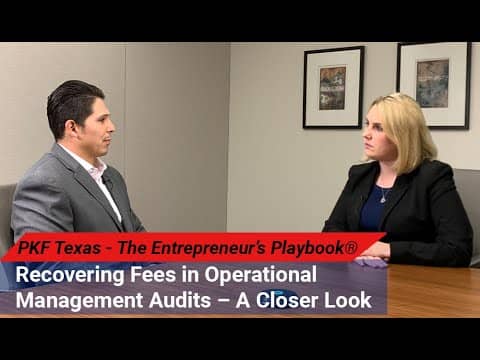Jen: This is The PKF Texas – Entrepreneur’s Playbook®. I’m Jen Lemanski, and I’m back again with Carlos Gomez, an audit manager and one of the faces of the PKF Texas Contract Compliance Services team. Carlos, welcome back to The Playbook.
Carlos: Hey Jen. Thank you.
Jen: In a previous episode, we talked about operational management audits, and you mentioned about findings and how we could find up to 10%. That sounds like a lot to me. What do we do in that process and what do findings look like?
Carlos: When we say 10% like that, that’s an industry standard throughout most contract compliance engagements. It’s 10% upon the amount of what we’re auditing or what our coverage is; whether it be gross sales or royalties, 10% is what we typically see. But we’ve had cases where certain clients I’ve seen have recovered 45% up to 100%, and that includes interest and audit fees on top of that, once those are recovered, because they meet a certain threshold within the agreement that now that third party is responsible for the fees. And then another great thing to keep in mind, too, is that the return on investment, like, our fees are never going to encompass the total amount that we find for you.
Jen: So, when we say recovered fees, what does that exactly mean? Is it something that was missing in the contract? Was it something that one of the parties didn’t do? Explain what that looks like.
Carlos: Yeah, so typically with these third-party agreements there’s some revenue share, some expense share, and that third party has to report that back to our clients. And now, whether that missed reporting is based on accident, intent, you know, just not understanding the contract, those types of things, they don’t pay our client the full amount of revenue that they should be, or their share of revenue, or their royalties or whatever the case.
And so, a lot of times in like the property management thing, what happens is they’ll share expenses, and some of the expenses aren’t allowed for the agreement. Or, like we’ve seen in other cases where the third party actually had ownership in an affiliate company that did the work, and because that company appeared to be an independent third party, they pass—those expenses became pass through instead of revenue share. And so, it got really tricky. There is a couple extra million dollars that we found that were ended up billed to our client.
Jen: Wow, well, that definitely seems like something. They need to get us in to take a look at everything.
Carlos: Yes ma’am, yeah. We got a client right now where actually the ROI on all the audits that we’ve done so far, their return on investment is about 260%.
Jen: That’s awesome. That’s great for the client. That’s really great for the client.
Carlos: Yes, you are not going to get that with any bank right now.
Jen: No, not at all. Well, we’ll get you back to talk a little bit more about this, because it seems like there’s a bunch of stories that you could tell.
Carlos: Yes ma’am. Thank you.
Jen: Perfect. For more information about this topic. visit PKFTexas.com/ContractCompliance. This has been another thought leadership production brought to you by PKF Texas – The Entrepreneurs Playbook®. Tune in next week for another chapter.

